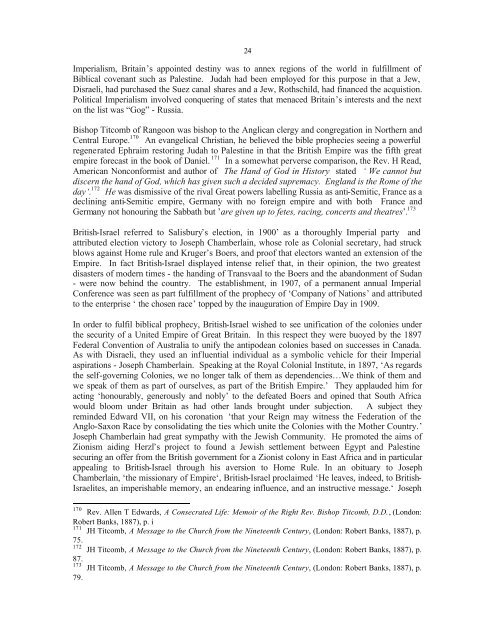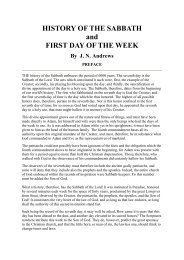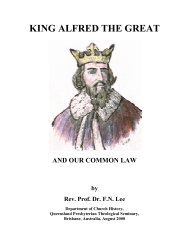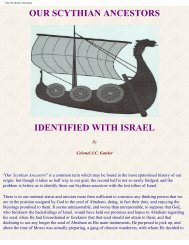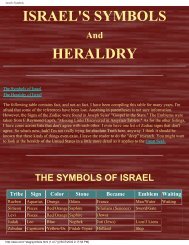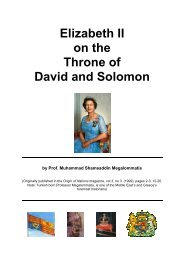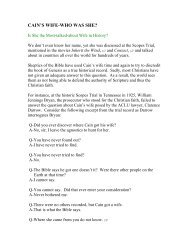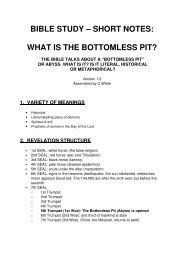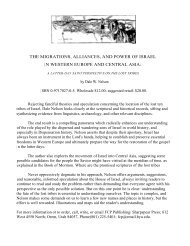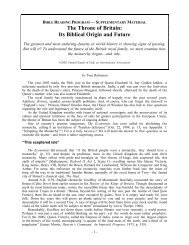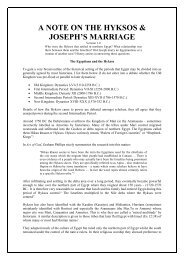The Political Influence of the British-Israel ... - Origin of Nations
The Political Influence of the British-Israel ... - Origin of Nations
The Political Influence of the British-Israel ... - Origin of Nations
Create successful ePaper yourself
Turn your PDF publications into a flip-book with our unique Google optimized e-Paper software.
24Imperialism, Britain’s appointed destiny was to annex regions <strong>of</strong> <strong>the</strong> world in fulfillment <strong>of</strong>Biblical covenant such as Palestine. Judah had been employed for this purpose in that a Jew,Disraeli, had purchased <strong>the</strong> Suez canal shares and a Jew, Rothschild, had financed <strong>the</strong> acquistion.<strong>Political</strong> Imperialism involved conquering <strong>of</strong> states that menaced Britain’s interests and <strong>the</strong> nexton <strong>the</strong> list was “Gog” - Russia.Bishop Titcomb <strong>of</strong> Rangoon was bishop to <strong>the</strong> Anglican clergy and congregation in Nor<strong>the</strong>rn andCentral Europe. 170 An evangelical Christian, he believed <strong>the</strong> bible prophecies seeing a powerfulregenerated Ephraim restoring Judah to Palestine in that <strong>the</strong> <strong>British</strong> Empire was <strong>the</strong> fifth greatempire forecast in <strong>the</strong> book <strong>of</strong> Daniel. 171 In a somewhat perverse comparison, <strong>the</strong> Rev. H Read,American Nonconformist and author <strong>of</strong> <strong>The</strong> Hand <strong>of</strong> God in History stated ‘ We cannot butdiscern <strong>the</strong> hand <strong>of</strong> God, which has given such a decided supremacy. England is <strong>the</strong> Rome <strong>of</strong> <strong>the</strong>day‘. 172 He was dismissive <strong>of</strong> <strong>the</strong> rival Great powers labelling Russia as anti-Semitic, France as adeclining anti-Semitic empire, Germany with no foreign empire and with both France andGermany not honouring <strong>the</strong> Sabbath but ’are given up to fetes, racing, concerts and <strong>the</strong>atres’. 173<strong>British</strong>-<strong>Israel</strong> referred to Salisbury’s election, in 1900’ as a thoroughly Imperial party andattributed election victory to Joseph Chamberlain, whose role as Colonial secretary, had struckblows against Home rule and Kruger’s Boers, and pro<strong>of</strong> that electors wanted an extension <strong>of</strong> <strong>the</strong>Empire. In fact <strong>British</strong>-<strong>Israel</strong> displayed intense relief that, in <strong>the</strong>ir opinion, <strong>the</strong> two greatestdisasters <strong>of</strong> modern times - <strong>the</strong> handing <strong>of</strong> Transvaal to <strong>the</strong> Boers and <strong>the</strong> abandonment <strong>of</strong> Sudan- were now behind <strong>the</strong> country. <strong>The</strong> establishment, in 1907, <strong>of</strong> a permanent annual ImperialConference was seen as part fulfillment <strong>of</strong> <strong>the</strong> prophecy <strong>of</strong> ‘Company <strong>of</strong> <strong>Nations</strong>’ and attributedto <strong>the</strong> enterprise ‘ <strong>the</strong> chosen race’ topped by <strong>the</strong> inauguration <strong>of</strong> Empire Day in 1909.In order to fulfil biblical prophecy, <strong>British</strong>-<strong>Israel</strong> wished to see unification <strong>of</strong> <strong>the</strong> colonies under<strong>the</strong> security <strong>of</strong> a United Empire <strong>of</strong> Great Britain. In this respect <strong>the</strong>y were buoyed by <strong>the</strong> 1897Federal Convention <strong>of</strong> Australia to unify <strong>the</strong> antipodean colonies based on successes in Canada.As with Disraeli, <strong>the</strong>y used an inf luential individual as a symbolic vehicle for <strong>the</strong>ir Imperialaspirations - Joseph Chamberlain. Speaking at <strong>the</strong> Royal Colonial Institute, in 1897, ‘As regards<strong>the</strong> self-governing Colonies, we no longer talk <strong>of</strong> <strong>the</strong>m as dependencies…We think <strong>of</strong> <strong>the</strong>m andwe speak <strong>of</strong> <strong>the</strong>m as part <strong>of</strong> ourselves, as part <strong>of</strong> <strong>the</strong> <strong>British</strong> Empire.’ <strong>The</strong>y applauded him foracting ‘honourably, generously and nobly’ to <strong>the</strong> defeated Boers and opined that South Africawould bloom under Britain as had o<strong>the</strong>r lands brought under subjection. A subject <strong>the</strong>yreminded Edward VII, on his coronation ‘that your Reign may witness <strong>the</strong> Federation <strong>of</strong> <strong>the</strong>Anglo-Saxon Race by consolidating <strong>the</strong> ties which unite <strong>the</strong> Colonies with <strong>the</strong> Mo<strong>the</strong>r Country.’Joseph Chamberlain had great sympathy with <strong>the</strong> Jewish Community. He promoted <strong>the</strong> aims <strong>of</strong>Zionism aiding Herzl’s project to found a Jewish settlement between Egypt and Palestinesecuring an <strong>of</strong>fer from <strong>the</strong> <strong>British</strong> government for a Zionist colony in East Africa and in particularappealing to <strong>British</strong>-<strong>Israel</strong> through his aversion to Home Rule. In an obituary to JosephChamberlain, ‘<strong>the</strong> missionary <strong>of</strong> Empire‘, <strong>British</strong>-<strong>Israel</strong> proclaimed ‘He leaves, indeed, to <strong>British</strong>-<strong>Israel</strong>ites, an imperishable memory, an endearing influence, and an instructive message.‘ Joseph170 Rev. Allen T Edwards, A Consecrated Life: Memoir <strong>of</strong> <strong>the</strong> Right Rev. Bishop Titcomb, D.D., (London:Robert Banks, 1887), p. i171 JH Titcomb, A Message to <strong>the</strong> Church from <strong>the</strong> Nineteenth Century, (London: Robert Banks, 1887), p.75.172 JH Titcomb, A Message to <strong>the</strong> Church from <strong>the</strong> Nineteenth Century, (London: Robert Banks, 1887), p.87.173 JH Titcomb, A Message to <strong>the</strong> Church from <strong>the</strong> Nineteenth Century, (London: Robert Banks, 1887), p.79.


